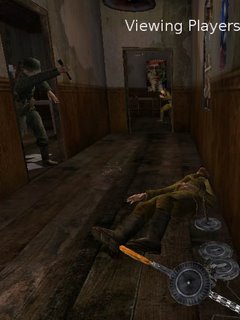Digital terrorism? Military and congressional intelligence?
"Any video game that comes out, as soon as the code is release, they will modify it and change it for their needs."Yikes! Scary stuff. Another Pentagon official testifies that
"Nowhere is this more evident than the computer games they're using as they target the youth. This is made by an American company, but they've created a new trailer and plug-in where if you register and send $25 you can play it. ... You can see how they use humor first to evoke emotion and then to evoke a response and then to direct that response in a direction that they want."
Yeah. The problem is that it's complete bullshit. The game is off-the-shelf, not modified in any way by anyone but the manufacturer. The trailer was reportedly made by a Dutch-born Muslim, a guy with a master's degree working in as a hospital quality manager in Europe. He just compiled his own clips from his gameplay. The humor he's evoking? Well, the soundtrack came from a PUPPET MOVIE made by the SOUTH PARK GUYS. All this, of course, comes under a $7 million contract to Science Applications International, which is monitoring the insurgents' Web sites.
I found an Australian ABC page discussing this in greater depth. GamePolitics features another interview with the trailer's author:
[[Trailer Author]]: It's not everyday that they label you part of al-Qaeda... and a Jihad recruiter. They demonised me by directly labeling me to someone from al-Qaeda who's trying to recruit innocent children that are playing this game, by using a mod [modification of an existing game].Clearly, a major threat to our nation.
[[GamePolitics Guy]]: What did you think when you heard the claim that you had "modded" the game? Isn't the character in the footage just the "Insurgent" faction from the "BF2: Special Forces" expansion pack?
[[Trailer Author]]: It is just in game footage from SF, no self made mod at all. I can't get even my own computer to work. So you can see programming isn't on of my strong points As a matter of fact my computer crashed just a few days ago, and for a month now I cant get BF2 to work...
Amusingly, the House Intelligence Committee isn't intelligent enough to properly link its own files. If you mess with the URLs to change the slashes and remove some extras, you can find valuable things, such as this RAND official's testimony on the use of the Internet or comments on how the media is releasing classified information.
MeTheSheeple failed to find a working transcript of all the Pentagon testimony in re: video games "created" by extremists. The ABC video, that first link I posted, includes some voice-overs to the effect of the game desensitizes the bad guys to killing Americans. The reporter may have put that in there himself. Yet it likely was a condensed version of the testimony.
Now, the idea of the Pentagon criticizing the desensitizing of youths toward violence through video game mods is funny, because the Pentagon created a custom video game from scratch as a recruiting tool. Yes, presumably the Pentagon supports the idea of more "good guy" soldiers and fewer "bad guy" soldiers. But to cast it in tones of moral superiority only when the other team does it, and then to advocate, sponsor and push for it when our team gets interested, is a bit on the hypocritical. Where does the moral superiority come from? Why is it generated? Why does no one realize that hypocrisy like this wrecks American credibility?
For the record, MeTheSheeple plays his own two video games. The latest is Red Orchestra: Ostfront, a historically based simulation of two armies that in their own ways ... well, could both be considered the bad guys. Just to pick one country, Poland: The Russians created Katyn and waited patiently while the Germans crushed the Warsaw Uprising, while the Germans committed a slew of atrocities that included the creation of Auschwitz. Just for the record.

And for the record, there, MeTheSheeple's the Russian with the DP-28. You know, the dead guy. Don't you love how the screen shot includes the German grenade in the air, though?


 One Iowa city tried strict sex-offender laws, and they backfired, according to
One Iowa city tried strict sex-offender laws, and they backfired, according to 
